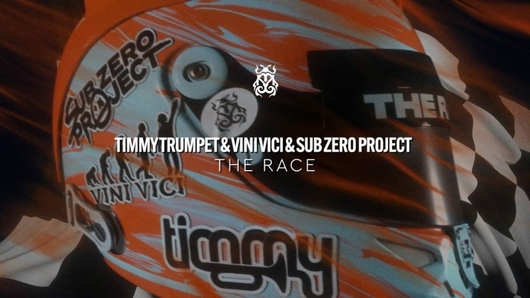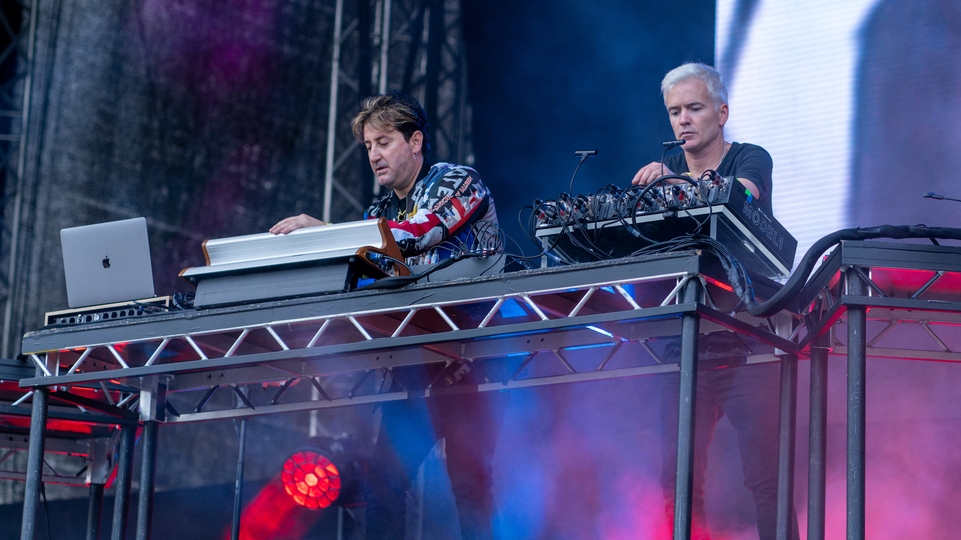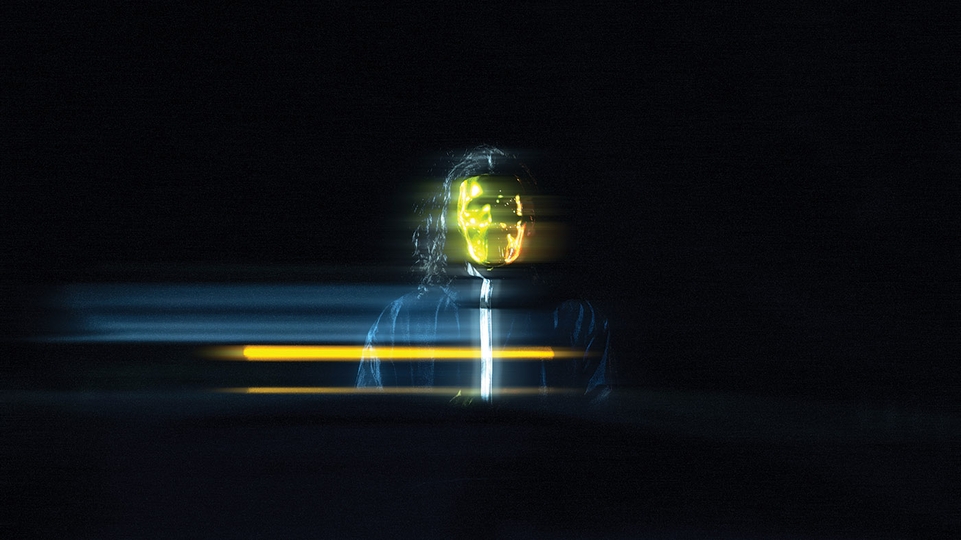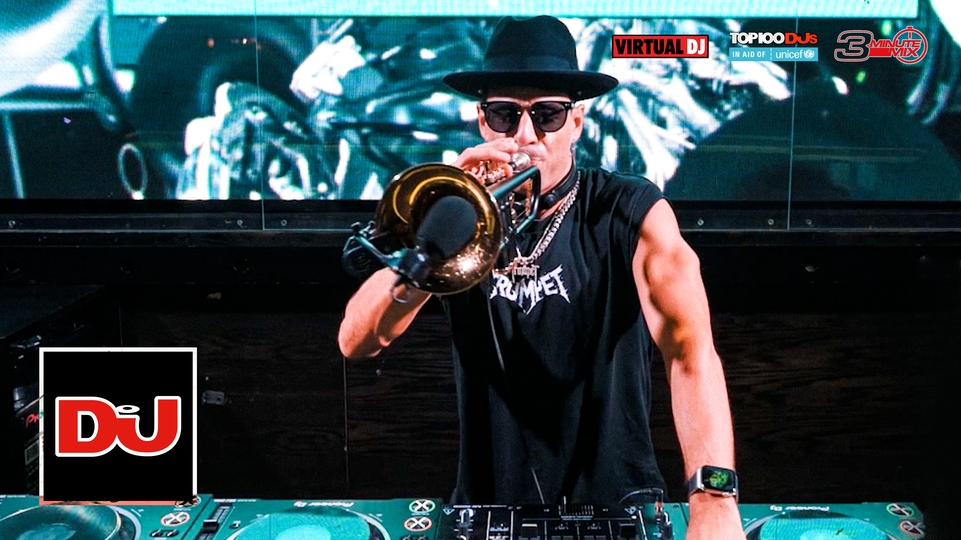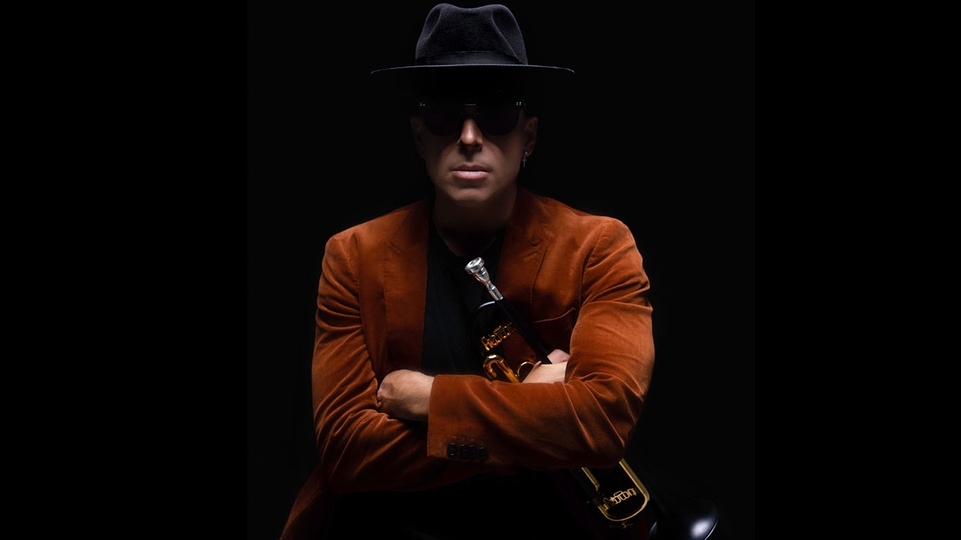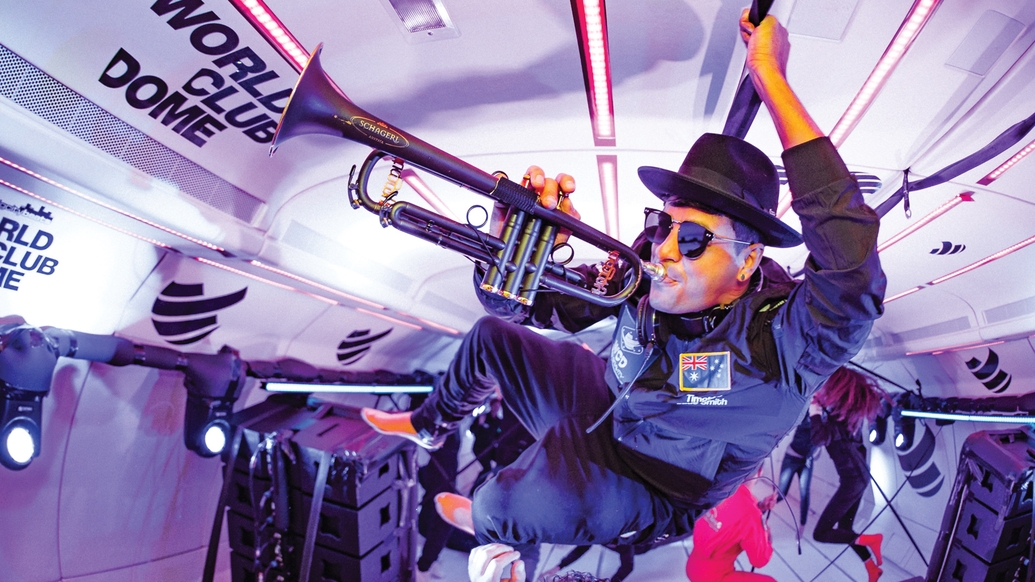
Timmy Trumpet: the art of chaos
Timothy Smith, better known to the festival-going world as the big-tune-spinning, horn-tooting Timmy Trumpet, presents a showman’s image of controlled anarchy when he’s on stage — but it takes a lot of hard work to get to where he is today. As he relaxed on an Aegean island, on a rare break from this summer’s main stage circuit, he filled DJ Mag in on his background in jazz, his reliance on Stoicism... and the New York Mets
Tim Smith is feeling fine. The man known to the world as Timmy Trumpet is on the Greek island of Ios, sitting on a sundrenched terrace, the blue water of a pool behind him and, stretching further in the distance, the even bluer vista of the Aegean Sea lapping up against a broad expanse of sandy beach. Along with his wife, Anett Tomcsanyi, and his team, he’s on a short holiday break from a packed summer season — besides his onslaught of festival dates, there’s a weekly residency at Amnesia on Ibiza with Steve Aoki — and Smith is taking an opportunity to fully settle into chill mode. Well, perhaps not fully chill — a workhorse performer, he’s just DJ'd at a party the night before.
“The party was just down there,” he says, gesturing toward the beach behind him. “I always play this one show here. There’s such a beautiful energy here. The island, back in the day in ancient Greece, was like a prison island where you’d get banished — but it was a hippie community in the 1970s, where all races, all nations and all sexes were welcome. You still kind of feel it whenever you come here. It’s beautiful. I’m really blessed.” Variations of the term “blessed” are scattered throughout Smith’s conversation with DJ Mag. It comes up, for instance, when he talks about the date he played just a couple of days earlier, one that sits on the opposite end of the gig spectrum from last night’s party — the main stage at Tomorrowland in Boom, Belgium.
For those unfamiliar with Smith’s music or onstage persona, a viewing of his Tomorrowland set, posted in full on the festival’s YouTube channel, is a good place to start. Alternating between bombastic neo-rave assault and sing-along anthems — The Elite’s version of Lorde’s ‘Royals’ works particularly well in that regard — he’s a category-5 force of nature, jumping up on the booth from behind the decks to rev the crowd up with his idiosyncratic dancing, hype-man exhortations and, of course, his trumpet. With his trademark fedora and shades in place, and shirtless for the bulk of his set, he cycles between his own tunes, à la the hot-off -the-presses track ‘The Race’ (aka “the one that goes ‘vroom, vroom, vroom!’” as he describes it) and his 2017 collab with Dimatik, ‘Punjabi,’ and a bevy of non-Trumpet tunes like Don Diablo’s ‘Momentum’ and Will Sparks’ edit of Charlotte de Witte and Enrico Sangiuliano’s remix of ‘The Age Of Love.’
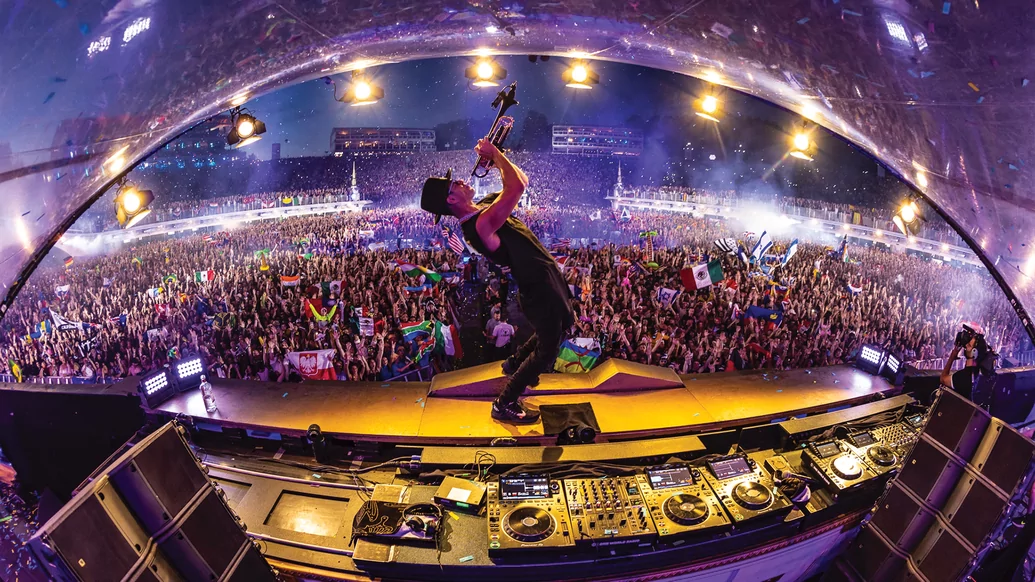
A near-steady flow of guests joins him onstage, including Sub Zero Project (his collaborators on ‘The Race’) and, performing ‘Blazin,’ Tinie Tempah and Enisa. Oh, and the Ramones’ ‘Blitzkrieg Bop’ is in there, too — the set lasts only an hour, but he sure knows how to give the crowd its money’s worth. It’s pouring down rain the entire time, but everybody — not least Smith himself — seems to be having a blast. The ambience is one of near-chaos, but it’s the kind of chaos that requires extensive preparation. For Smith, Tomorrowland is at the top of the festival food chain, and he treats it as such. “The way I look at it is, every show prior to Tomorrowland is sort of a preparation for Tomorrowland,” Smith says. “Every show is a test. Every time I’m putting a new track in and seeing what works, it’s in order to put together the best possible show for Tomorrowland.”
Of course, preparation only gets you so far. “Everything can completely be flipped on its head,” he continues. “Like Enisa I had just met for the first time as we were going on stage, talking about what we were going to do up there. Or the rain, which was relentless for that hour I was on stage, so I was just so fortunate that the crowd still came to the stage and still raged with me.” Judging from his party-to-the-max onstage attitude — a bottle of Don Julio 1942 tequila seems to always be within reach — one might not expect Smith to be the philosophical type.
One would be wrong, it turns out, and his approach to life helps him to deal with little things like a summer monsoon during one of the highlighted dates of his festival calendar, or anything else that might come his way. “Going up on stage at something like Tomorrowland, I'll have Marcus Aurelius’s words in my ears, thinking, ‘amor fati, Tim,’” he says, reciting one of the tenets of Stoicism. “Accept what’s coming for you, but also embrace it and love it. Marcus Aurelius’s Meditations, Seneca... I got into it through Ryan Holiday and Stephen Hanselman’s book, The Daily Stoic. I’m fascinated by it. The resilience you can get from that, it's incredible. When all else fails, Stoicism stands very fast.”
That kind of mindset is surely one of the keys to Smith’s success and popularity — he’s been in the upper echelon of DJ Mag’s Top 100 DJs list for the past half-decade — but it’s just one of many factors that have gotten him to where he is. His whole life, in one way or another, has been preparation for this day. “When I’m on that stage,” he says, “I don’t know what’s going to happen there. I don’t know what I’m going to say there. I don’t know what I’m going to play there. And that feeling is something I have been addicted to since I first discovered jazz.”
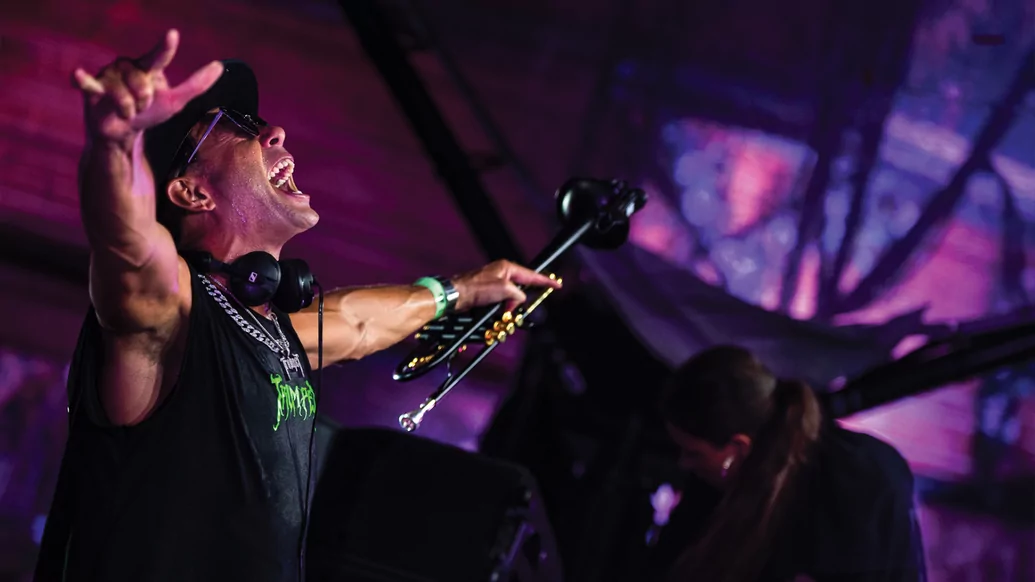
“I’d go from one club, walk out, go to the next one. I was addicted to it. I’d be getting paid an hourly fee, and then I would sleep in my car afterward.”
Born and raised in Sydney, Australia, Timothy Jude Smith was playing trumpet by the age of four, thanks in no small part to a horn-playing father. Classically trained, he snagged a Young Musician of the Year award at age 13 and was granted a full scholarship to the Conservatorium of Music, where the lead trumpet player of the Sydney Symphony Orchestra, Anthony Heinrichs, was a tutor. But another musical form was beckoning. “Growing up, there was always an hour or two before school, and after school as well, where I’d be doing concert ensemble, fanfare group, all these different things,” he says.
My parents used to drive me hours for tuition from different trumpet players. But they have always encouraged me to do whatever it is that I love, and they've never really held me back. So the Conservatorium of Music, that was sort of my classical thing — but I loved jazz — and when I started getting into it, that’s when you could say I studied the art of chaos. I wanted to improvise on everything — so I would just put the radio on and jam along to whatever was playing.” Smith spent a few years in his teens serving as lead trumpet for the Australian All-Star Stage Band, touring Australia and making stops at major jazz festivals throughout Europe, including the Montreux Jazz Festival in Switzerland and the North Sea Jazz Festival in the Netherlands.
“Sweden, Switzerland, Germany, Denmark, everywhere,” Smith recalls. “And I was still a teenager, still in high school! But to be a jazz musician, you have to really master the instrument. The only job you have is to be the best virtuoso of that particular instrument, so it’s highly competitive. Guys like Arturo Sandoval, these trumpet players that are legends... I don’t think I could cut it at their level.” Smith was searching for another avenue to scratch his creative itch. He had been falling in love with electronic music, via a route that’s led many in that same direction: Daft Punk’s ‘Homework.’ “That record changed my life,” he says. “I was like, ‘maybe this is the new jazz music!’ I became addicted to it. And yes, a lot of my fellow musicians that were in big bands, orchestras, fanfare groups, all those things alongside me, they looked at me like I had sold my soul, but I didn’t care, because I loved it.”
Soon, he was purveying his horn skills at dance clubs throughout Sydney’s Kings Cross neighborhood, improvising over his DJ friends’ sets. “I used to play five or six clubs a night, four or five nights a week,” he says. “I’d go from one club, walk out, go to the next one. I was addicted to it. I’d be getting paid an hourly fee, and then I would sleep in my car afterward.” Despite the less-than-stellar sleeping arrangement, he relished that period. “It was a really experimental phase in my life. I remember going to guitar shops, plugging the trumpet into all these different guitar pedals, and seeing what would come out. And you know, I fell in love with this DigiTech vocal pedal — I think I bought 30 of these pedals, because I would spill alcohol on them and destroy them.”

The name Timmy Trumpet is both straightforward and genius — it’s impossible to forget, a marketer’s dream come true — but Smith can’t claim credit for the moniker. “The clubs in Kings Cross would put these posters up, and I started seeing ‘Timmy Trumpet’ on them,” he recalls. I was like, ‘who came up with that?’ I guess they were looking for a way to promote me. I didn’t really have a business mind at the time.” Spinning came out of necessity, not out of any burning desire to become a superstar DJ. (“All I wanted to do back then is to play trumpet for other DJs,” he claims.)
One night, Smith was set to improvise over a set at Opera Bar, a touristy venue right by the Sydney Opera House — but when the DJ didn’t show up, the promoter panicked. “I remember him going, ‘Mate, what are we going to do? We need you to play,’” Smith says. “I went to my car, I pulled out all the CDs, and I tried to DJ. From there, it was like, ‘maybe I can do this on my own!’ And when I wasn’t doing it, I was listening to dance music — or spending time in the studio with mates who were trying to make it, teaching ourselves Ableton.” The seeds of a career, one that would take him far beyond the nights of sleeping in his car, were beginning to sprout.
Smith proved to be a popular studio mate, one of the few among his peers who actually had schooling in the sometimes arcane details of music theory. “Everyone wanted to work with me, because I would teach them the musical side of things — what was in key, what’s not in key, chords, all that,” he says. “I don’t think it’s something that is a natural gift or talent — it’s just something that I studied from a very young age, and I’m fortunate that my dad gave me that edge when I was young.” He recalls spending his Saturdays doing ear training. “You would literally sit in a room against a wall with a piano behind you. They’d just play notes and you have to write down what they’re playing. You wouldn’t even get given the root note at the start — you just have to know.”
He considers that kind of training to be one of the fundamental factors (along with a healthy dose of showmanship, of course) to his later success. He gives harmonic mixing as an example. “If you listen to my sets, most of my mixes are key mixed,” he explains. “If you’re mixing out of key, it’s as bad as mixing out of time. Even if the crowd doesn’t know what it is, they will feel subconsciously that something’s wrong, and they might go get a drink at the bar, or go watch a different stage or something. I try to keep them there and keep them in the moment. In terms of building a set, I look at it as sections — sections that have certain keys that roll into one another.”
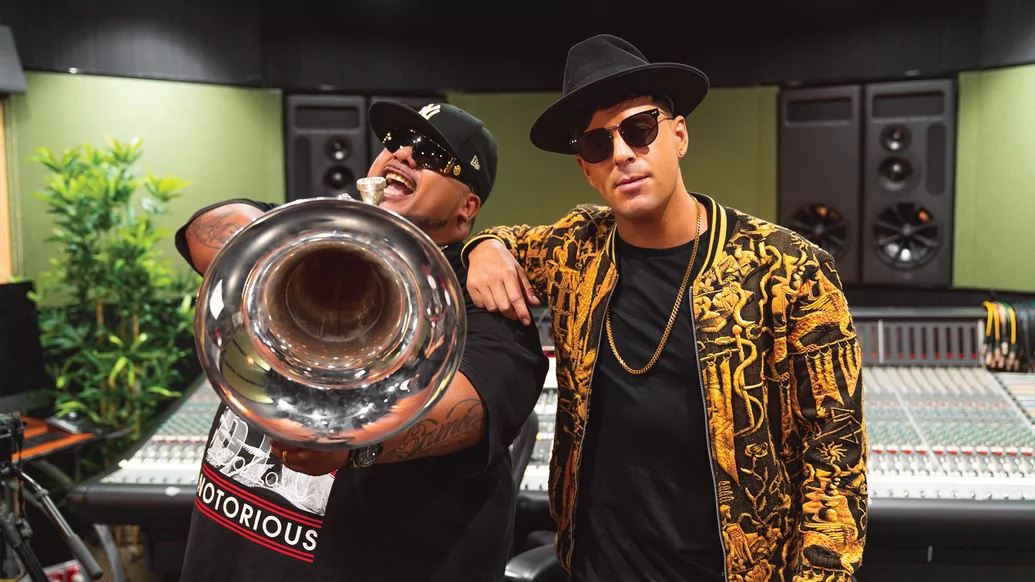
“The only thing that I know for sure is that I don’t know anything for sure. So I am open to everyone’s ideas, always, and I’m opposed to nothing. When you get in the studio with someone, and you present that kind of mentality to them, you’re able to create something unique.”
The debut Timmy Trumpet release came in 2009. Dubbed ‘Sunrise,’ the EP — ‘Sunrise,’ ‘Sunset,’ and “that little track in between there,” as Smith recalls it (it’s titled “Nothing Between Us’) — is a relatively subdued start to his discography, its three tracks following a gently uplifting, trance-tinged dance-pop path. “It’s funny, because it randomly started playing on my phone the other day, you know, when you connect your Bluetooth and it occasionally plays old music. It brought a tear to my eye. I was thinking that there are elements of that track that are popular now, which is really cool. I love the cycles of music. Like, watch the house and techno that we grew up on come back, but in a different way. It’s never exactly the same, and it’s fascinating.”
His releases, in various fest-friendly styles, started coming slowly at first — and then in a torrent. Tracks like the electro-housey ‘Horny,’ a 2011 collab with Tenzin; the bleepy, chuggy ‘Sassafras,’ with Melbourne DJ Chardy, released on the mighty Hussle Recordings in 2012; 2014’s marching-band-goes-to-the-rave number ‘The Buzz,’ produced with the New World Sound duo — these are among the tunes that established Smith’s dance music bona fides, and many were hits in his native land and beyond. ‘The Buzz,’ for instance, reached Number One on the Beatport charts. But it was arguably the stomping ‘Freaks,’ released in August of 2014 and featuring the formidable New Zealand rapper Savage, that put Timmy Trumpet on the international map, hitting various pop and dance charts around the world; it eventually was certified platinum in America.
But even though it was Smith who handled the production side on the track, he gives his collaborator the bulk of the credit. “It wasn’t so much me that got it there,” Smith says. “Savage is extremely talented and he was really hot — he had a track on the radio at the time. Him wanting to be on that record was the big break for me, and I’m blessed that he wanted to do it.” Smith had been on the festival circuit to some degree before ‘Freaks,’ but his career was now in full swing. His first post- ‘Freaks’ gig, at Budapest, Hungary’s Pecsa Music Hall in the early spring of 2015, proved to be a life-changer. “I arrived at the airport thinking, ‘I can’t believe I’m in Europe,’” he says. “I had no idea what to expect — and the whole airport was full of Timmy Trumpet fans. They had a band playing ‘Freaks.’ People were holding signs, everything.”
In the crowd was a woman who had driven some of her Timmy Trumpet–adoring friends to the airport. Something, somehow, clicked between her and Smith, and she gave her number to Smith’s tour manager. “But he was a bit intoxicated and wrote down the wrong number,” Smith says. “I texted that number for six months, and she never replied to me, but I never stopped thinking about her. Finally, after six months, I came back to play in a club in Hungary again.” As it turned out, the woman was at the club Smith was playing, and he relayed the word to her that he wanted to reconnect. “People were like, ‘Timmy wants to meet you.’ She goes, ‘He never texted me!’ But she met me, and I showed her the messages I had sent. Then she started coming on tour with us, and she was learning English. And now we’re about to reach 10 years of knowing each other.”

The woman is now his wife. Smith popped the question to Anett Tomcsanyi on July 10, 2020 in pure Timmy Trumpet showman fashion — a surprise proposal, during a mid-pandemic live stream. At one point during the stream, Smith grabs Tomcsanyi by the hand. “We usually perform this song here,” he says. “But we’re gonna try something diff erent. I want you to stand up on the DJ booth — we’re gonna perform it up here on the DJ booth. Is everyone up? Is everyone ready?” Smith drops down on bended knee. Tomcsanyi, both hands pressed to her mouth, looks genuinely shocked. “You make me the happiest man in the world. I can’t imagine a life without you. You’re my best friend, you’re my partner in crime, you’re my one true love. I want to spend the rest of my life with you.” He hands her a ring. “Will you marry me?” (Spoiler alert: She said yes.) “That was definitely the best day of my life,” Smith says. “It’s a massive support, having a wife who really is devoting her life to helping you. I am really lucky.”
Married life has required a bit of a lifestyle change, though — but Smith seems all the happier for it. “Being in love, it gives you a purpose and a kind of goal. Before I was a little bit lost, you know? I don’t do after-parties anymore, which is great. I don’t miss them, either. The rest of the team, they’re all hungover today — most of them haven’t even woken up. [Note: He’s speaking to DJ Mag at 4pm local Ios time.] But now I get off stage and come straight home. Like last night, after the party, I actually came back here and enjoyed a bottle of red wine alone with the wife before we went to bed.” Another Timmy Trumpet highlight, albeit one a bit less life-altering than that proposal, came via an unlikely platform: Major League Baseball.
In 2018, the Seattle Mariners relief pitcher Edwin Diaz had begun to use ‘Narco,’ a massive 2017 fanfare of a collaboration between Smith and Blasterjaxx that slotted perfectly with Diaz’s take-no-prisoners style. Diaz was traded to the New York Mets, and in 2020, after a rough patch, he switched his walk-up song to ‘No Hay Limite’ by Miky Woodz. Luckily for all concerned, Diaz switched back to ‘Narco’ in 2021, his fortunes improved, and 2022 was proving to be an all-star year for the veteran. As ESPN put it, “How New York Mets closer Edwin Diaz went from Big Apple bust to the King of Queens.” Was ‘Narco’ the key? Well, his slider probably had something to do with it — but we’ll go with “yes.” Smith, however, was unaware of the buzz around ‘Narco’ until his baseball-loving tour manager filled him in, and late in the season, in the thick of a playoff race, he was asked to perform the tune live at Citi Field.
On September 1st, 2022, Smith played his trumpet as Diaz strode the mound to close out the game. The Mets won 2 to 1, Diaz earned his 29th save of the season, and Smith was a freshly crowned king of New York. A new world of Timmy Trumpet demographics — mainstream American sports fans, of the sort who may have never gotten within miles of an electronic music festival — opened up. He probably made a few late-night TV converts as well — later that September, he appeared on the Jimmy Kimmel show, where he played ‘Narco’ as the walk-on tune for sidekick Guillermo Rodriguez. ‘Narco’ has proved to be one of those massive tracks that are destined to endure far beyond the sell-by date of your average tune — and Smith’s discography is riddled with major league hits.
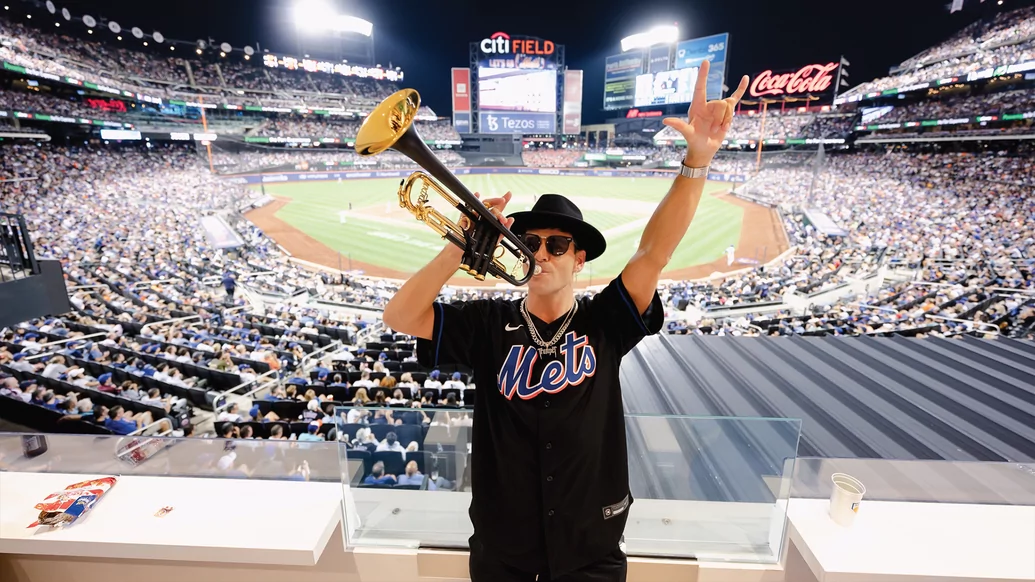
Still, Smith doesn’t claim to have a magic formula for writing a big tune. “You just never know. You’re trying to create an emotion when you do it. But with ‘Narco,’ I’ve got to hand it to Blasterjaxx — Idir and I spent a lot of time on the hook together,” referring to one half of the Dutch production duo. “It was difficult. We wanted to create the emotion of going into battle — you’re marching, or on a horse, you’re going into a fight. Sometimes those hooks that seem really obvious and easy are the most difficult to finish, and it took hours. Others roll out easy — a track like ‘Freaks’ might be two hours from beginning to end.”
Like both ‘Narco’ and ‘Freaks,’ a vast portion of the releases on the Timmy Trumpet discography (the man seems to pump out a few cuts every month) are collaborations. Hardwell, Julian Jordan, Alok, Steve Aoki, Dimitri Vegas, R3HAB — the list of Smith’s collaborators reads like the lineup of the biggest EDM fest that there’s ever been. “I love collaborating,” he says. “The only thing that I know for sure is that I don’t know anything for sure. So I am open to everyone’s ideas, always, and I’m opposed to nothing. When you get in the studio with someone, and you present that kind of mentality to them, you’re able to create something unique.”
Getting a fresh perspective from other artists is likely one of the factors that keep Smith’s output relatively genre-agnostic, with the main connecting thread between his productions being that they’re almost all the kind of music that sounds best when played in front of thousands of revelers. “I love getting in the studio with others and trying to create a new genre — I feel like that’s the goal for every producer, to create something nobody’s heard before. By collaborating, learning from whoever it is that I’m collaborating with, it’s increasing the chances of that happening — which is going to bring joy and impact to the world, you know?”
Hardstyle, pop, house, breakbeat or whatever he concocts in the studio — they all have a role to play in a Timmy Trumpet set. Drum & bass, too — though Smith’s proffering his own take on the sound. “I love drum & bass, but I feel like when I play it live, it’s a little too fast at 170 BPM,” he explains. “So I’ve just been warping it in Ableton using Complex Pro, warping it down to sort of 150, 155 — and it’s working. We sort of had the sped-up house movement last year, and I’m experimenting now with a slowed-down drum & bass movement. I don’t know if anyone’s done it yet, but I’m having a go at it.”

“I come from a jazz realm where anything outside of jazz... a lot of jazz musicians, they don't even consider it music. For a long time, I’ve had criticism from that realm — but you just do what you love, you know?”
Amid his seemingly nonstop production and touring schedule, on top of everything else, Smith has a weekly podcast, SINPHONY Radio, which sees him spinning “the hottest festival anthems of then and now,” paired with a bit of his characteristically hyper-positive chatter. “I love radio shows, and it’s been a goal of mine to have one,” he says. “It’s about a way of presenting the music — not just my music — and creating a community. I dedicate time to it every single week. It means that I have to travel with my sound card and my microphones and everything, but I do what it takes. I take a lot of pride in it, and it brings me a great deal of happiness.”
As happy and upbeat as Smith seems in conversation, any level of success — let alone the kind that brings world-conquering fame — comes with its share of haters. For someone with an in-your-face persona like Timmy Trumpet, that's doubly true, as it certainly makes for an easy-to-hit target. Smith, however, seems oblivious to the slings and arrows of any detractors. “I come from a jazz realm where anything outside of jazz... a lot of jazz musicians, they don't even consider it music,” he says by way of explanation. “For a long time, I’ve had criticism from that realm — but you just do what you love, you know?”
Smith cites ‘Psy Or Die,’ a 2016 collaboration with Gordo (who was still going by his old Carnage moniker) as an example. “I just discovered psy-trance,” he says, “and that music really hit me. Like, what the fuck is this? It’s so fast! The bass is so big — how do they get that bass that big? I became addicted to it, and we went in and made this record. We posted the record, and I think there were 50,000 comments of hate from the psy-trance community. There were almost like death threats in there! I didn’t mean to piss anyone off. I didn’t try to do anything to offend anyone. I was just trying to write a record in a genre that was new to me that I really felt at the time.”
Then, Smith drops an unexpected question: “Did you know I spent time as a wedding singer?” No, we did not. “Yeah, for five years,” he continues, “starting in high school. I used to sing all the old Frank Sinatra classics, week in and week out — restaurant gigs, wedding gigs, any gig that would take us. With my best friend, a guitarist, we just walked from table to table, singing and playing jazz. So yeah, I’ve got pretty thick skin when it comes to people complaining about the music!”

At any rate, it hardly matters at this point — the Timmy Trumpet train keeps chugging along, and with Smith’s work ethic and positive attitude, there’s little chance of it derailing anytime soon. “I don’t really have days off,” he says. “When the passion kicks in, you can’t stop. But my mom taught me this as a teenager, because I became obsessed with work — she said to me, ‘It’s important to take a holiday every day, just for one hour.’ For me, how I do it is I don't look at my phone when I wake up. I always spend the first hour of my day, just thinking — people can call it meditation, or analyzing your thoughts, or whatever. The only thing that gets in the way is if I’m really hungover and we have a flight to catch. But you know the saying — if you’re doing what you love, is it really work?”
Of course, that’s easy to say when you’re sitting in the sun on a beautiful Greek island. But Smith takes a philosophical viewpoint of his success, of the arc of a career that’s taken him from trumpet lessons to playing five clubs in one night to producing chart-topping hits to headlining on the festival world’s main stages. “There was a moment where I was sitting in this pool behind us just yesterday,” he says, “when we just came over from Tomorrowland, and my wife was swimming in the pool laughing, and I was just thinking, ‘this is it. This is the moment I’ve been seeking.’ But it’s a very temporary feeling — literally the next day, or even the next hour or the next minute, you’re back at it. Your brain is always striving for more. I often ask myself why. Like, what’s enough? And I don’t know the answer to that. But I am very, very grateful for everything that I’ve experienced so far, and I do know that I am blessed.” There’s that word, yet again — and a world of Timmy Trumpet fans are blessed as well.

